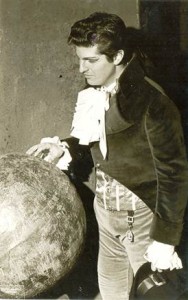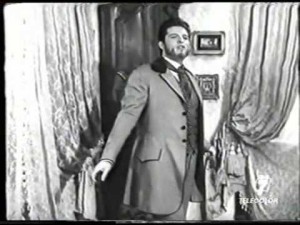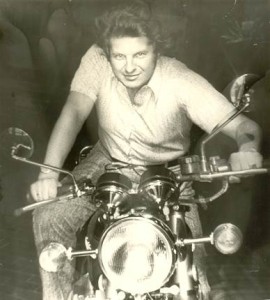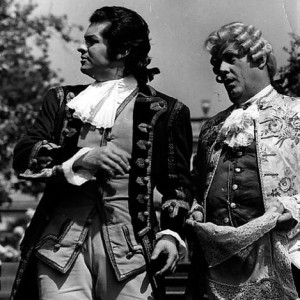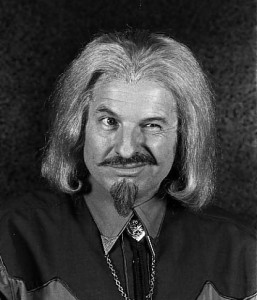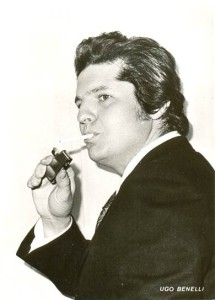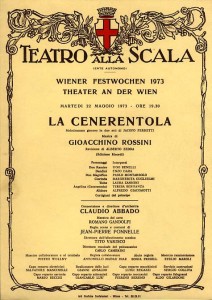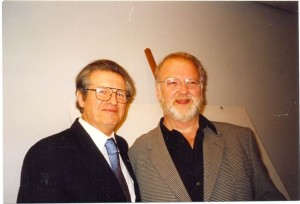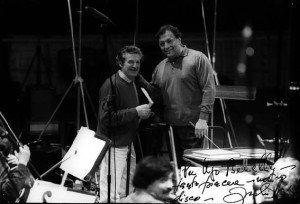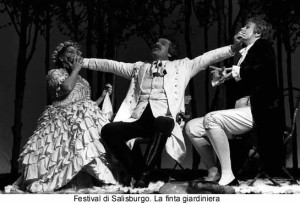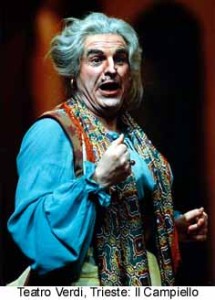Spätestens die Italienischen Romanzen im zweiten großen Veröffentlichungsschub von Deccas „Most wanted recitals“ (dazu der Beitrag in operalounge.de) machen noch einmal auf den italienischen Tenor des Zwischenfachs, Ugo Benelli, aufmerksam, der wie seine Kollegen Alva, Valetti oder Monti jene Sparte bediente, das heute so gut wie ausgestorben ist, den tenore di grazia, Rossinis oder Bellinis Ideal, aber eben auch fähig, größer zu singen, der aber eben immer bei seinem „Leisten“ blieb und durch Süße des unverkennbar individuellen Tons und unerhörte Technik der bestsitzenden Stimme sich auszeichnete. Der flämische Journalist Jan Neckers, selber Musik- und Stimmenkenner par excellence und Autor vieler Publikationen zu diesem Thema, hat uns liebenswürdigerweise sein Gespräch von 2011 mit Benelli bei Opera Nostalgia überlassen und dem seine eigenen Erinnerungen an den Tenor vorangestellt. Geerd Heinsen
Like most people in those days before internet and with only Opera Magazine widely available in Europe I had not heard of Ugo Benelli until the moment Decca made public its recordings of La Cenerantola (with Simionato) and Il Barbiere di Siviglia (with Berganza, Corena, Ghiaurov and Ausensi – also unknown unless one collected zarzuela LP’s which rarely left Spain in the fifties and sixties). All at once it seemed there was a new Rossini tenor star in heaven and one who did not only have style and coloratura facility. There was the sweetness of Monti as well and a very good top; in short this was a more attractive voice than Luigi Alva who somewhat monopolized the role of Almaviva. Moreover at Decca some producers had discovered that a really complete recording without the usual cuts was quite a selling argument for their sets so that they would supersede (together with their superior sound) the Callas or De los Angeles recordings of the same operas. Therefore producer Eric Smith and conductor Silvio Varviso (who nevertheless resorted to barbarous cuts in a Norma recording a few years later) went for the full score and re-instated „Cessa di più resistere” in the second act of Barbiere, brilliantly sung by Benelli. From that moment on Benelli became the best tenore di grazia of his generation; a worthy successor to his great predecessors in the twenties and thirties: Roberto D’Alessio, Giovanni Manurita, Luigi Fort, Nino Ederle. Nevertheless Benelli had two big problems; one was called Corelli, Bergonzi, Price, Cossotto, Del Monaco, Tucker, Caballé etc. The great Verdi and Puccini hits could still be easily cast on the world’s big stages as there were still the voices to sing them while “The New Golden Age of Singing” was on between 1945 and 1975 and the interest in belcanto operas was not overwhelming. The second problem was that the real Rossini renaissance started only at the end of the seventies and many of the official recordings would only appear ten years later at the moment Benelli had already a full career behind him, transferring to interesting comprimari roles.
Personally I heard the tenor for the first time in early 1968. Flemish public radio organized several opera concerts a year, mostly with less than stellar singers (and it is a cliché but a true one: singers like Antonioli, Amadeo, Novelli, La Macchia, Vicentini, De Osma, Berini, Marchica, Maccianti, Mariotti etc. would indeed be stars nowadays). So it came as a small surprise there would be a concert with a big name we knew from records like Benelli while Enzo Dara too already had a fine reputation and Giovanna Santelli would never be known outside a small circle of collectors. The concert took place in the formidable big auditorium Studio 4 of Flemish Radio at the Flageyplein in Elsene-Brussel. There was only one small disillusion: the announced “Suzel buon di” for which Benelli’s voice was so well suited was replaced by a far more common Elisir duet. Benelli in the flesh was as good as on his recordings. His “Una furtiva lagrima” was the best I ever heard, sung meltingly beautiful and the house rightfully came down. As every young belcanto lover I was somewhat conceited and though I always attended those concerts I sometimes neglected to record them (and discovered a few years later at the producer’s untimely death that a barbarian had ordered them to be wiped as “tape was not cheap”). With the Benelli concert I did not take a risk and I have proof of his performance. Somewhat later I once again was lucky enough to attend a radio concert, recorded at the Ghent Opera on the 27th of April 1968. It was a Rossini gala concert with Benelli, Alfredo Mariotti (with whom he had recorded Don Pasquale), Cecilia Fusco and Oralia Dominguez. I vividly remember his “ding ding” utterances in the amusing finale of the first act of L’Italiana and the lovely sheen of the voice when he repeated the main theme in that marvellous under recorded “Dal tuo stellato soglio” from Mosé.
The last time I heard him was at a performance of Don Pasquale at De Munt in 1973. The voice had maybe lost a little bit of its beauty though it was still extremely fine but there was some new strength as well. He capped the cabaletta to the “Povero Ernesto !” with a clear high C and what a pity it is he was not allowed to record that part of the score on his DG recording of 1964. In the seventies he was several times on TV and we could watch him in complete performances of Il capello di paglia di Firenze and L’Italiana in Algeri, both shot in colour in 1975 and 1976. By 1983 he decided to switch to comprimari roles and sang Dr. Cajus at De Munt, though the voice had still a lot to offer. Witness the live recordings circulating among collectors of his concerts with popular Italian songs at Wexford in 1983 or Aix in 1985.Some years ago I wrote a review of his delightful performance on the Deutsche Gramophon Don Pasquale recording and I compared him with that star of today: Juan Diego Floréz. I could only conclude that in my opinion Benelli was born too soon as he was in no way less gifted than the Peruvian tenor. Indeed, as I heard both in the flesh, I still think Benelli had the slightly more beautiful voice and it is a shame Decca or other labels didn’t offer him more recording opportunities so that nowadays he is somewhat unjustly forgotten. Recently I got a mail from “un vecchio tenore” to thank me for my review. That’s when I got the idea to ask Mr. Benelli for an interview and he was glad to concede it. Nowadays Ugo Benelli still lives in his beloved Genova; in an apartment with a fine sight on the Mediterranean. Every year he presents an operatic concert in his birth place and he teaches. Those who want to contact him will find all necessary information on his website ugobenelli.com. Jan Neckers
Und nun das Interview: Please, tell us something about your youth in Genova. I was born on the 20th of January of 1935 in the beautiful port city. My grandfather and my parents made hats for ladies and I helped when growing up. War time was terrible for my family. After Italy surrendered to the Allies in 1943 my father was captured by the Germans and taken to Germany. He was there for more than two years until he finally came back: out of 150 prisoners only seven returned; all others had starved. It is said our name derives from Ben-Eli (son of God). Maybe we are from Jewish extraction. Anyway, my mother with two children, Ugo six and Paolo two and an old grandfather, stayed in Genova under threat of continuous air attacks. The worst raid was by the RAF which razed almost the whole of the city. After the war I had a very normal life: going to school, studying…not too much and spending my free time in the nearby church oratory playing football, table-tennis and playing jokes on other boys. Once as a boy scout I couldn’t resist pissing into the hat of a boy I disliked. I was somewhat unpredictable but I received punishment when I deserved it.
When did music come into your life? It was always there. My grandfather had a gramophone with many records to create a pleasant atmosphere in the workshop. I remember Caruso’s “Vesti la giubba” and “No Pagliaccio non son”, Pertile’s “Oh Lola” and “Mamma quell vino”, Martinelli’s “Che gelida” and “Celeste Aida”, Stracciari’s “Di Provenza” and “Pari siamo”, Ruffo’s “Cortigiani”. All in all more than one hundred records. Moreover my aunt played the piano in the house. When she got married I started to have lessons though I was not too enthusiastic being ten years old. And then there was the movie house. I saw movies with Gigli, Lugo, Tagliavini, Becchi and Gobbi and loved their songs. As a tenor I would often sing songs from their movies like “Vieni, c’è una strada nel bosco”, “Mamma”, “ Funiculi, funicula”,” Vento, vento”, “Malinconia”,”Santa Lucia”, “Musica Proibita”. Before it was bombed out I never visited the Carlo Felice opera house but soon after the war I attended two performances with my mother when I was twelve. The theatre was slightly restored. There were no boxes anymore but red curtains covered the walls. I remember a Traviata with Tebaldi, Prandelli, Capecchi and Elisir with Tagliavini, Taddei and Alda Noni.
When did you start singing seriously? I loved singing in church, at school and at home. When I was eighteen a lady living next door was very impressed and took me to her singing teacher. At the time I had just taken a job as an accountant and my father was not happy with a singing career. But my mother encouraged me and I started studying seriously. I studied with Pietro Magenta, a private teacher who in reality was a very famous lawyer. His father had been an ambassador to the Court of Saint-Petersburg. Magenta was passionate about singing and he was a very good teacher who had several talented pupils like Giuseppe Campora, Rosetta Noli, Ottavio Garaventa, Piero Di Palma, Fabio Giongo etc. I didn’t have to pay for his lessons and we pupils only contributed a slight sum for the rent of the studio and the electricity. When Magenta was happy with our progress he would offer us a delightful evening meal with fine French wines. I studied with him for three years and then I won a competition organized by La Scala and entered Scuola Perfezionamento Artisti Lirici (I Cadetti della Scala). The main teacher was maestro Giulio Confalonieri though I followed courses as well with maestro Ettore Campogalliani and Maestro Russo. A good knowledge of solfège was required and all teachers provided severe vocal and stage training. And smoking was definitely not allowed. Maestro Confalonieri at La Scala was one of the most experienced musicologists in the world and I learnt ornamentation with him. At the time ornamentation had to be legato. Only afterwards Claudio Abbado – very fond of Teresa Berganza’s Spanish style – would allow staccato ornamentation which became somewhat obligatory for all singers. Maybe in another twenty years a new conductor will go back and ask legato once again. But I also learned from older singers as I loved to listen to their recordings of “Ecco ridente il cielo” and “Se il mio nome”. Giovanni Manurita’s was technically perfect though somewhat old-fashioned. I particularly studied Roberto D’Alessio’s recording of Il Barbiere as I loved his voice, his style and his cadenze. When I auditioned in Florence singing “Ecco ridente”, D’Alessio was in the board of examiners which I didn’t’ know. He jumped out of his chair exclaiming “you have studied my recording !”. I got the contract.
What’s your take on vocal technique? First and most important; you need to study and continue to study. I studied SIX years. I’d like to quote Verdi who said (on composing): “let’s return to the ancients and it will mean progress”. He or she who cannot breathe properly will never learn properly how to sing. I know that Bergonzi for instance did more breathing than vocal exercises. Therefore an aspiring singer has to do long exercises on how to breathe with the nose. Even during actually singing, try to breathe with your nose and don’t hurry: do it calmly. Sesto Bruscantini, a great friend who taught me a lot on stage deportment, advised me to tie a belt under the diaphragm so that I would be sure the breath would leave as low as possible. Take care. At the outset of my career everything went smoothly. I had a natural voice but after a few problems it started to lower. I bought a professional recorder and my wife played some chords on the piano. I repeated them and after each vocalise I listened and repeated the right notes and again and again till I had it right. Ferruccio Tagliavini used the same method; hours and hours at the piano looking for the right and beautiful sound. Paolo Montarsolo used to say that one should sing like one sleeps: only the diaphragm and the breath are important while the rest of the body should be completely relaxed.
When did you make your début and how did the career take off from then onwards? My début was in Montevideo in 1958. I sang Arlecchino in Salieri’s Arlecchinata and I was very afraid. The following year I sang in Barbiere in Cincinatti. In 1960 I made my début at the Liceu of Barcelona with Falstaff. In those days you had to prove your worth and were not immediately asked in famous theatres. In 1962 I sang for the first time in Palermo and the year afterwards I was at the Regio in Parma with Falstaff. That year too I made my début with Sonnambula in “la mia seconda patria”; Ireland. At the festival of Wexford where I would often return I started with La Finta Giardiniera in ´65. In 1966 I sang for the first time in your country: Cosi fan tutte at De Munt. One year later I had the greatest triumph of my career when I sang Nemorino at Glyndebourne. The following year was maybe the most important as I had débuts at the Venice Fenice with I Quatro Rusteghi, the San Carlo with Elisir and finally at La Scala with La Pietra del Paragone. In 69 I sang I Quatro at the Rome Opera, Don Giovanni at Dallas and that same year I substituted for Luciano Pavarotti in La Figlia del Reggimento at La Scala: a great success. Finally our own Carlo Felice engaged me for the same opera. Important dates are my opening of La Scala with L’Italiana in 1973 and my début at Covent Garden the year afterwards in Don Pasquale. That severe critic Harold Rosenthal wrote I was the best Ernesto he ever heard, on a par with the famous Schipa-recording.
Wasn’t it difficult to have a career and a personal life as well? Well, it was not easy. I got married with Angela Maria on October 23rd of 1961. This year will be the 50th anniversary of our marriage. Our children are Roberto and Nicoletta. He is a biologist who does cancer research and has three little Benelli’s: Miriam, Sara and Stefano. Nicoletta has a beautiful daughter, Roberta, who goes to university. But as a singer I was often far from home, far more than I would have liked. Sometimes when I came home the children were somewhat afraid of me and it took me several days to conquer them again. Angela often left the children for a few days with their grannies so that she could stay with me.
How was your recording career? In 1963 I started with that famous Decca Cenerentola with Giulietta Simionato, Paolo Montarsolo, Sesto Bruscantini and Giovanni Foiani. The following year I recorded Barbiere conducted by Varviso. It was producer Erik Smith who engaged me for the Decca recordings. Erik and I became very close friends so that I had my son baptized Roberto Paolo Erik. I never signed an exclusivity contract though once we discussed it. But the Rossini renaissance was very far off in those days so that I never got to record other operas. That same 1964 I recorded Don Pasquale for Deutsche Grammophon, now re-issued on CD though it is a pity the cabaletta was cut. One year afterwards Karajan asked me to sing Beppe in his famous Pagliacci with Bergonzi and Taddei.
By the way, there is still a story going around that soprano Joan Carlyle substituted at the last moment for somebody else but this is not true. She was there from the first rehearsal. I repeated the same role for Decca two years later with McCracken and Lorengar. In 1968 I recorded my only solo album for Decca together with Lydia Marimpietra: romantic songs by Rossini and Bellini. The pianist on that album is a certain Enrico Fabbro, in reality Erik Smith. I never was required to record an operatic album. Then I had to wait till 1975 for the famous television performance of Il capello di paglia di Firenze and one year later I finally did L’Italiana in Algeri with the young Lucia Valentini-Terrani as Luigi Alva still sang Lindoro in the 1963 Decca recording. And there are many recordings of my comprimari roles in lesser known operas, especially on the Bongiovanni label.
How come Alva was somewhat preferred to you at La Scala? Do not forget Alva is eight years older than me. So he reached La Scala several years before me and he started his career contemporaneously with Panerai, Bruscantini etc. He was already a star when I came at La Scala and he took precedence. Nevertheless I had the big opportunity to be the “first choice” as Lindoro in L’Italiana in Algeri and I had the honour of opening the La Scala season in 1973 which is a dream for every singer. Abbado had chosen me. At La Scala I was paid 1.000.000 lire a night (something like $ 1500 at the time).
Did you ever perform with the Metropolitan Company? During the sixties I auditioned for Rudolf Bing and his European representative in Europe Roberto Bauer. My audition went very well and they proposed me to sing Don Giovanni and Madama Butterfly. The first role I could do but no way I would wreck my voice as a “tenore di grazia” on the second role, so I declined the offer. Mind you, it was not a question of decibels. My voice always projected well and it rang more beautiful in a big than in a small house. In 1973 I had a difficult choice. Schuyler Chapin was now general manager and Levine the principal conductor and they asked me for their own production of L’ Italiana in Algeri. As the performance dates clashed with the La Scala rehearsals for the same opera I had to refuse. Thirteen years later Levine and producer Jean-Pierre Ponelle asked me for 4 performances as Don Basilio in Le Nozze. It was the same evening Thomas Hampson made his début as the count and José van Dam, Kathleen Battle, Paolo Montarsolo and Elisabeth Söderström and Frederica von Stade too were in the cast.
What were your favourite roles and where did you draw a line? I loved to sing La Fille du Régiment and I sang more than 40 performances of it. I especially remember my performances with Mirella Freni and at La Scala I sang with her in two performances, substituting for Pavarotti who was ill. At the time we still sang it in Italian though it was the French performing edition which included the aria “Pour me raprocher de Marie” (= Per viver vicino a Maria). I also sang the role at the Teatro Regio in Turin, the Teatro Comunale in Bologna and the Liceu in Barcelona. Another favourite was Le Comte Ory which I sang for the first time in 1968. At the time only Michel Sénéchal and myself covered the role and I took part in many productions; in French too with Erede conducting and Ponelle directing. And another fine role was Ernesto in Don Pasquale.
What were the heaviest roles you attempted? In 1961 I sang Des Grieux in Massenet’s Manon at Cincinnatti Summer Opera with Mary Costa and Nicola Moscona. A foolish thing to do at that time but I was too young and too involved. Later on I often sang Nadir in Les Pêcheurs de perles; in Italian and in French; the latter one at the Teatro Petruzelli in Bari in 1982. I was asked to sing Werther by the Teatro Sociale di Como but I declined. I knew Tito Schipa sang the role but I thought it could be dangerous even to sing only one performance. I never tried to force my voice and the natural evolution made it possible to sing more roles of a “tenore lirico”. So I sang in Linda di Chamonix. Maybe I should have dropped my Rossini roles at that moment and go for the Duca or Arturo as Trieste asked me to sing I Puritani.
When did you decide to change from primo to secondo uomo? In 1982 I was in Glyndebourne singing Il Barbiere and L’amour des trois oranges. Before I left George Christie asked me to come back next year to sing Basilio during Glyndebourne’s 50th jubilee. At first I was very disappointed to become a second tenor but my wife asked me to reconsider as I was approaching my fifties. Thanks to this decision my career went on for 23 years more.
Isn’t it a pity you didn’t make more records? Yes it is. My first agent however was very possessive and I decided to manage my own career. Maybe not the best solution. I have several great live tapes of my performances and I hope some of them will appear on record.
What’s your opinion of your rivals and successors? Luigi Alva had a very fine voice; pure class. One should not forget Pietro Botazzo who sang so easily. Then there was Renzo Casselato who had a very beautiful voice; somewhat like a very young Gigli. At the time some people would ask my opinion on my own voice and I would say:” Well, I’ve got a little of the qualities of those three colleagues !”
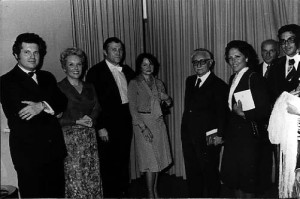
Ugi Benelli: Inaugurazione della stagione concertistica/ di Santa Cecilia GIULIETTA E ROMEO Direttore Georges Ptrêtre/ U. Benelli, B.M. Casoni, G. Prètre e signora, il presidente della repubblica Leone e signora leone/Benelli
Later on there was Rockwell Blake. He was very strong in staccato notes (the machine gun sound/Neckers) though his voice was not commonly called beautiful but he was a great professional. Nowadays one hears that Blake’s method is the way to sing Rossini. But I still think that in ten, twenty years singers will return to more legato in florid singing like my maestro Giulio Confalonieri wanted it. After Blake came Bruce Ford; a great tenor. The sound was more rounded and he had a very long breath and was a great technician. During a recording I handed over my sceptre, symbolically spoken of course.
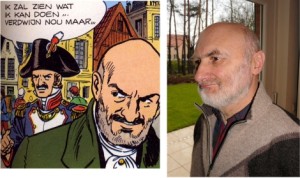
Jan Neckers, historicus, columnist bij “ ‚t Palieterke “ en „De Kerjeuze Mecheleir“ als figurant in „De laatste opstand“/Mechelen Blogt
And of course there is now Juan Diego Floréz. I first heard him in Wexford when he sang in L’Etoile du Nord by Meyerbeer. I immediately understood here was a tenor with great potential. I told him he should only apply himself to mezza-voce and to smoothly going from forte to piano. Much later he sang in Genova and I went to his dressing-room. When he saw me the first thing he said was: “You heard, Maestro ? I can now do it !”. I heard him in La Donna del Lago. Unbelievable. When ascending and descending a phrase with his acrobatic agility he can even smoothly sing a note in the descending part when the breath with other singers runs out. This makes him unique. (Jan Neckers)
Eine Diskographie gibt es hier.

